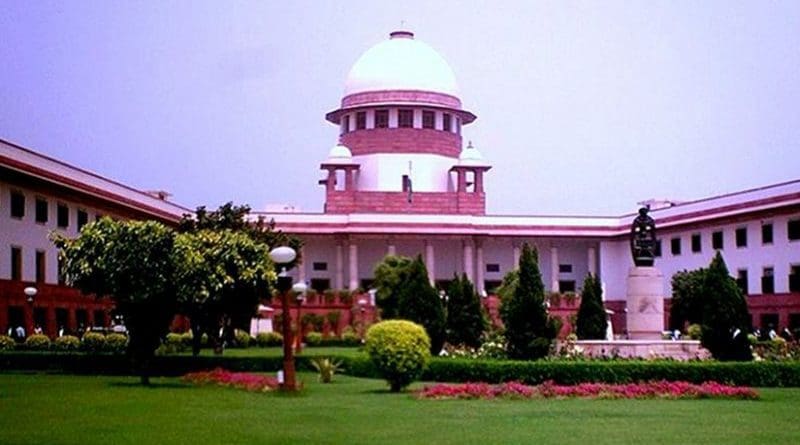Calling the PIL Bluff – OpEd
The dismissal of a Public Interest Litigation (PIL) filed by advocate K.L.N.V. Veeranjaneyulu, who took exception to a particular chapter in a book written by Writer and Social Scientist Kancha Illaiah, came as a breather. The Supreme Court dismissed the petition to uphold the fundamental Right of Free Speech, “keeping in view the sanctity of the said right and also bearing in mind that the same has been put on the highest pedestal by this court”. The judiciary’s stand on the issue couldn’t be clearer. It will not permit an individual or group to curbing a fundamental right through a motivated PIL.
“Any request for banning a book of the present nature has to be strictly scrutinised because every author or writer has a fundamental right to speak out ideas freely and express thoughts adequately. Curtailment of an individual writer/author’s right to freedom of speech and expression should never be lightly viewed,” a Bench of Chief Justice of India Dipak Misra, Justices A.M. Khanwilkar and D.Y. Chandrachud recorded in the order.
Under the guise of representing the Public, politically charged or personally motivated individuals have been misusing the PIL tool for their skewed ends. Now, however, the judiciary has been calling their bluff with heart-warming alacrity.
In a nation, where masses are hugely illiterate and have poor little access to legal aid otherwise easily accessible to the middle class and the moneyed few, Article 32 of the Indian Constitution provides a tool to a member of the public to file a suit through judicial activism. That member can be a non- governmental organisation, an institution or an individual acting on behalf of the aggrieved parties.
It started in the late seventies, when Senior Advocate Pushpa Kapila Hingorani produced two pages to the Apex Court, detailing the deplorable condition of undertrial prisoners – men, women, children, lepers and mental patients – languishing in jails in Bihar ignored by the state and asked the court to intervene and give orders to release them on bail. The-then appalled Supreme Court bench headed by the-then Justice Prafullachandra Natwarlal Bhagwati went on to release 40,000 prisoners from various jails across India! The case, better known as Hussainara Khatoon Vs Home Secretary, Bihar, was India’s first PIL.
Over the three decades that followed, PILs grew from being a far-reaching tool of justice for a vibrant judiciary and a socially- inclined activist media to getting reduced to a juicy byte ensuring a moment of fame by the media and legal professionals alike. It’s only now that the judiciary has, in a strategic display of judicial activism, identified and isolated the scourges at play.
Look at the stand the Apex Court took even against the surge in populism: Despite tempers running high across India with regard to the Varnika Kundu case, wherein the ‘politically powerful’ were accused of stalking and attempted abduction, a Public Interest Litigation filed by human rights lawyer Ranjan Lakhanpal, seeking judicial supervision of the probe into the incident, was promptly dismissed by a division bench of the Punjab and Haryana High Court.
Citing a 1991 apex court judgment, the division bench of Acting Chief Justice S.S. Saron and Justice Avneesh Jhingan maintained that court would have no difficulty taking up the case if Varnika herself approached the High Court. They ruled, “In a criminal case, only the aggrieved persons have a right to file the PIL,” citing the landmark 1991 judgment on maintainability of a PIL in which the Supreme Court had ruled that “even if there are million questions of law to be deeply gone into and examined in a criminal case… it is for them [aggrieved parties] and them alone to raise all such questions and challenge the proceedings initiated against them at the appropriate time before the proper forum and not for third parties under the garb of public interest litigants”.
This ruling examined the issue of locus standi and underlined the tendency for private individuals under the garb of public interest to file PILs and thereby load the already-buckling legal system. It was an incisive ruling that put to rest everybody’s interest in an issue that was primarily a private one. This, now, becomes a precedent for similar private motivated motions being masqueraded as litigations of public interest.
Soon after, came the Delhi High Court dismissing BJP leader Subramaniam Swamy’s plea seeking court-monitored SIT probe into the death of Congress MP Shashi Tharoor’s wife Sunanda Pushkar through a PIL.
Terming his PIL as a “textbook example of a political interest litigation,” the Delhi High Court bench of Justices S. Muralidhar and I.S. Mehta said the petition by Swamy cannot be entertained as a PIL. It said that from what was placed before the court, it was unable to be persuaded that the probe, being carried out by the SIT, is botched up or under the influence of any party. “Although Subramanian Swamy claimed he has not concealed any data or information, when asked specifically about the basis of his allegations in the petition, his response was to seek time to file affidavit thereby clearly showing that what was to be disclosed at the first instance was not done,” the court said.
The bench maintained that “Courts need to be careful that judicial process is not used by political persons for their own purposes”.
“This is not to say that political persons cannot file PILs, but courts have to be extra cautious when allegations are made against other political persons,” the bench added.
This ruling examined, once again, the issue of locus standi and underlined the tendency for politicians, under the garb of public interest, to file PILs and thereby use the legal system to level grudges. It was a strategic ruling that publicly identified political parties’ interest in PILs and will serve as a precedent for stopping similar future misadventures.
It is indeed heartening to see the PIL tool being used in the manner it was originally intended to.

